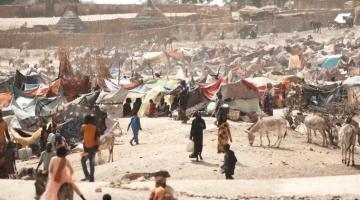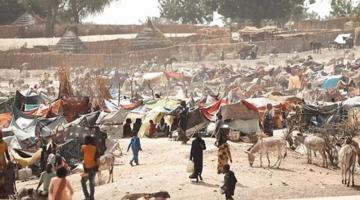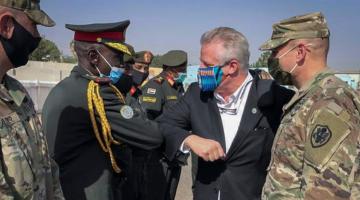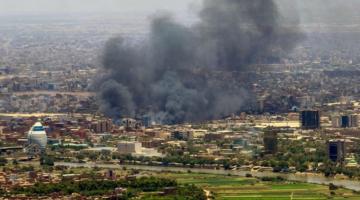Sudan’s Anti-Coup Protesters Reject Agreement to Reinstate Prime Minister Abdalla Hamdok
The people of Sudan reject the military's attempt to give legitimacy to the coup waged against the civilian government. They demand a representative government free from military and foreign intervention.
This article originally appeared in Peoples Dispatch.
In Sudan, a 14-point agreement was signed between army chief and coup leader Abdel Fattah al-Burhan and deposed prime minister Abdalla Hamdok. The deal has secured an agreement to release all political prisoners arrested since the coup. However, the ministers of the dissolved government, who will be released if the agreement is honored, will not return to the cabinet. The PM is to form a new cabinet made up only of technocrats with no representation from political parties.
After the military coup on October 25, the transitional government was dissolved and its civilian leaders arrested. Hamdok was also being held in house arrest since the coup.
The Sovereignty Council, the highest body in the transitional government, where the military and civilian leaders chosen by centrist political parties shared power before the coup, was also reinstated on November 11 after it was purged of the civilian representatives of political parties and replaced with other civilians favorable to the coup leaders.
Even prior to the coup, the military had held most of the real power in the transitional government. In effect, what has been secured by the agreement is not even a return to the transitional government – but a mutated version of it, rid of all representatives of political parties. They are to be replaced with technocrats who are not likely to pose the slightest challenge to the military’s political control.
Hamdok loses support
By agreeing to such a compromise, Hamdok has lost his main support base, the Forces of Freedom and Change (FFC), which has refused to recognize the agreement.
The FFC is a coalition of centrist and right-wing political parties which after the ouster of former dictator Omar al Bashir by the December Revolution, struck compromises with the military following the June 3, 2019 massacre. The power-sharing deal they signed with the military made way for the formation of the transitional government in August 2019.
The coalition has been demanding a return to this transitional government, as it was before the coup. The section of protesters who had been rallying behind Hamdok hoping that he would bargain to bring the transitional government back, have expressed shock at the compromise deal. “Only hours before, Hamdok had considerable support. Now after the deal, the streets have overwhelmingly turned against him,” a source in Khartoum told Peoples Dispatch.
Notably, the majority of the protesters had refused to recognize the return of a transitional government led by Hamdok. They had instead been demanding a full-civilian government to which the military is subordinate. The military has ruled Sudan for the most part since independence.
This section of protesters is led by the main forces behind the December Revolution – the trade union coalition Sudanese Professionals Association (SPA) and the neighborhood resistance committees, both of which are organizing in coordination with the Sudanese Communist Party (SCP).
The SCP was among the first parties that took the lead to form the FFC in December 2018 when mass-demonstrations had begun that eventually led to Bashir’s ouster in 2019. However, the SCP quit the FFC in protest against the power-sharing agreement that other political parties in the coalition struck with the military.
Over the subsequent two years, the inability of the civilian section of the government to wrest control over the economy from the military and to hold its generals accountable for the June 3 massacre had become evident.
On October 21, four days before the coup, millions had taken to streets demanding full-civilian rule, and raised slogans against the transitional government’s power-sharing agreement which was deemed as a “bloodshed partnership”.
“Down with bloodshed partnership” has remained the cry in the rallies and protests that have been taking place across the country since the coup. However, blood continues to be shed. Over 40 people, mostly protesters, are estimated to have been killed by the security forces since the coup. Hundreds have been wounded with bullets, many of them, grievously.
On November 17, when hundreds of thousands took to streets across the country, at least 16 people were killed and over a 100 injured in Khartoum alone. Security forces are alleged to have even barged into hospitals, stopped the treatment of injured protesters and taken them into custody. Even on November 21, when Hamdok shook hands with Burhan, another protester was shot in the head and killed, while several others were injured.
“We will continue to fight on the streets until the military junta is completely overthrown”
Hamdok’s signing of this agreement “despite what the coup (forces) have done since October 25” is a “shame”, the SCP said in a statement. It called for the continuation of civil disobedience and political strike, and reiterated its position vis-a-vis the military with the slogan: “No bargain, No partnership, No compromise.”
Emphasizing that “we will continue to fight on the streets until the military junta is completely overthrown,” the coordination body of the resistance committees in the south belt said in its statement that “anyone partnering with the military is an enemy to us.” The SPA said that by signing this agreement which is “betrayal of the blood of the martyrs,” Hamdok has committed “political suicide”.
The Professional Pharmacists Association in its statement said, “what happened today was only a change of masks” to give the military dictatorship a “facade” of civilian rule. The Democratic Association of Veterinary Doctors reiterated that civilian rule has to be “snatched” from the military without negotiation, bargain or compromise.
Environmentalists Association, Animal Production Specialists Association, Psychiatrists Association and several other organizations affiliated to the SPA have pledged to continue the strike and civil disobedience until full civilian rule is achieved.
Disregarding this popular sentiment, the “Chairperson of African Union Commission, Moussa Faki Mahamat, has learned with satisfaction of the signing of the agreement reached between (Burhan and Hamdok),” read a statement by the regional body. The US and the UN are reported to have played “crucial roles” in shaping this agreement.



















